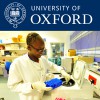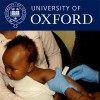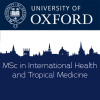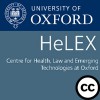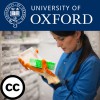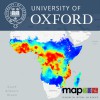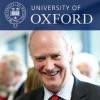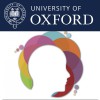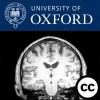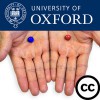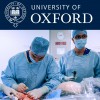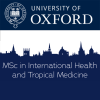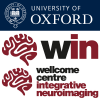Medical Sciences Division

Relevant Links
The Division comprises over 2200 academics and staff, 800 graduate students and 900 undergraduates; about 350 NHS Clinicians and GPs contribute to our teaching activities. In total over 2500 individuals are involved in research.
Medical sciences research at Oxford has maintained its pre-eminent standing, as demonstrated by the results of the 2008 Research Assessment Exercise (RAE). Analysis of the preliminary results published in December 2008 places Oxford medical sciences research as being of the highest quality in the UK in four separate medical science disciplines.
Series associated with Medical Sciences Division
| # | Episode Title | Description | People | Date | |
|---|---|---|---|---|---|
| 1316 | Let's talk e-cigarettes, November 2025 | Jamie Hartmann-Boyce and Nicola Lindson discuss emerging evidence in e-cigarette research and interview Elly Leavens, University of Kansas Medical Center, USA. | Jamie Hartmann-Boyce, Nicola Lindson, Elly Leavens | 01 Dec 2025 | |
| 1315 | Creative Commons | Sustained aviremia despite anti-retroviral therapy non-adherence in male children after in utero HIV transmission | A conversation with Philip Goulder about the recent article ‘Sustained aviremia despite anti-retroviral therapy non-adherence in male children after in utero HIV transmission’. | Philip Goulder, Paul Klenerman | 27 Nov 2025 |
| 1314 | After the End Episode 5: Time, Mortality, and the Immortal Jellyfish | In this episode of the podcast series After the End, Patricia Kingori, Miranda Lowe, Felix Flicker and Martin O'Brien come together for a discussion on time, mortality and immortality. | Patricia Kingori, Miranda Lowe, Felix Flicker, Martin O'Brien | 24 Nov 2025 | |
| 1313 | Season 3 Episode 2 | Our Brains, Our Selves: In Conversation with Prof. Masud Husain | In this episode, we are joined by Professor Masud Husain, neurologist and clinical neuroscientist at the University of Oxford, to explore how the brain’s failures can reveal its deepest workings. | Masud Husain | 10 Nov 2025 | |
| 1312 | After the End Episode 4: Living in Zombie Time – Martin O’Brien | What is it like to live in Zombie Time? Performance artist Martin O’Brien opens the conversation on living beyond predicted life expectancy in what he calls ‘zombie time’. | Patricia Kingori, Martin O’Brien | 10 Nov 2025 | |
| 1311 | After the End Episode 3: Does Time Exist – Felix Flicker | Does time exist? Theoretical physicist Felix Flicker from the University of Bristol explores whether time exists and living after the end of the universe. | Patricia Kingori, Felix Flicker | 27 Oct 2025 | |
| 1310 | Let’s talk e-cigarettes, October 2025, episode 46 | Jamie Hartmann-Boyce and Nicola Lindson discuss emerging evidence in e-cigarette research and interview Justin Strickland, Johns Hopkins University School of Medicine. | Jamie Hartmann-Boyce, Nicola Lindson, Justin Strickland | 27 Oct 2025 | |
| 1309 | After the End Episode 2: The Immortal Jellyfish – Miranda Lowe | The Jellyfish that refuse to die. MIRANDA LOWE CBE, a principal curator in the Department of Life Sciences at the NATURAL HISTORY MUSEUM in LONDON, introduces us to the extraordinary world of the immortal jellyfish. | Patricia Kingori, Miranda Lowe | 23 Oct 2025 | |
| 1308 | After the End Podcast Introduction – Patricia Kingori | Who decides when it’s over? In this episode of the podcast series After the End, Professor Patricia Kingori introduces the project and sets the stage for what’s to come. | Patricia Kingori | 23 Oct 2025 | |
| 1307 | Regulatory T cell therapy is associated with distinct immune regulatory lymphocytic infiltrates in kidney transplants | A conversation with Fadi Issa about his recent article on regulatory T cell therapy in kidney transplants. | Fadi Issa, Paul Klenerman | 20 Oct 2025 | |
| 1306 | Extra - 2024-25: the year in review | We discuss the highlights for the CPM in 2024-25, and look forward to the next year. | Rachel Horton, Anneke Lucassen, Susie Weller, Ali Kay | 14 Oct 2025 | |
| 1305 | Season 3 Episode 1 | Through the Looking Glass: How Your Eyes Decode the Light Show | How does the human eye transform waves of light into the vivid, detailed experience we call vision? | Ivan Pekar | 09 Oct 2025 | |
| 1304 | Series 3 Episode 6: Equity | The CPM team discuss considerations of equity in personalised medicine. | Rachel Horton, Anneke Lucassen, Susie Weller, Nishtha Bharti | 30 Sep 2025 | |
| 1303 | Let’s talk e-cigarettes, September 2025, episode 45 | Jamie Hartmann-Boyce and Nicola Lindson discuss emerging evidence in e-cigarette research and interview Ryan Courtney from the University of New South Wales, Australia. | Jamie Hartmann-Boyce, Nicola Lindson, Ryan Courtney | 26 Sep 2025 | |
| 1302 | Series 3 Episode 5: Health economics | Rachel Horton and Sally Sansom from the CPM team discuss health economics with James Buchanan, Padraig Dixon and Sarah Wordsworth. | Rachel Horton, Sally Sansom, Padraig Dixon, Sarah Wordsworth | 12 Sep 2025 | |
| 1301 | Ebola virus persistence: implications for human-to-human transmission and new outbreaks | A conversation with Miles Carroll and Oliver Meek about their recent Ebola virus persistence review article. | Miles Carroll, Oliver Meeks, Paul Klenerman | 11 Sep 2025 | |
| 1300 | Wired for Care: Neural Circuits with Dr. Johannes Kohl | In this episode, Neddy speaks with Dr. Johannes Kohl on the brain circuitry behind instinctive behaviours like parenting and shares insights for early-career researchers navigating the fast-moving world of neuroscience. | Neddy Kareha, Johannes Kohl | 09 Sep 2025 | |
| 1299 | A Good Science Read: How our brains make our selves | Professor Dame Uta Frith and Professor Frances Ashcroft discuss 'Our Brains Our Selves: what a neurologist’s patients taught him about the brain' by Masud Husain | Frances Ashcroft, Uta Frith | 01 Sep 2025 | |
| 1298 | Let's talk e-cigarettes, July 2025 | Jamie Hartmann-Boyce and Nicola Lindson discuss emerging evidence in e-cigarette research and interview Elias Klemperer from the University of Vermont, USA. | Elias Klemperer, Jamie Hartmann-Boyce, Nicola Lindson | 31 Jul 2025 | |
| 1297 | Let's talk e-cigarettes, June 2025 | Jamie Hartmann-Boyce and Nicola Lindson interview Lauren McMillan, University of Stirling about her project evaluating the effectiveness of an e-cigarette intervention for smoking cessation at centres for people experiencing or at risk of homelessness. | Jamie Hartmann-Boyce, Nicola Lindson, Lauren McMillan | 30 Jun 2025 | |
| 1296 | ‘Dangerous Matter’: A New Opera on Vaccine Science, Memory, and Innovation | A conversation with Zakiya Leeming and Rachel Hindmarsh about the Thanks for the Memories project and a new opera. | Zakiya Leeming, Rachel Hindmarsh, Paul Klenerman | 23 Jun 2025 | |
| 1295 | Creative Commons | CMV serostatus is associated with improved survival and delayed toxicity onset following anti-PD-1 checkpoint blockade | A conversation with Ben Fairfax about the recent article: CMV serostatus is associated with improved survival and delayed toxicity onset following anti-PD-1 checkpoint blockade. | Ben Fairfax, Paul Klenerman | 13 Jun 2025 |
| 1294 | Creative Commons | Representation and Research Culture – a US Perspective | Professor Keisha S. Ray joins us for a cross-continental conversation on representation and research culture, in which we explore the experiences of racially minoritised researchers working on both sides of the Atlantic. Recorded in July 2023. | Harleen Kaur Johal, Keisha S. Ray | 04 Jun 2025 |
| 1293 | Let's talk e-cigarettes, May 2025. Ep 42 | Jamie Hartmann-Boyce and Nicola Lindson discuss emerging evidence in e-cigarette research and interview Steve Cook from the University of Michigan USA about the importance of correctly interpreting and assessing the available data. | Jamie Hartmann-Boyce, Nicola Lindson, Steve Cook | 30 May 2025 | |
| 1292 | A Good Science Read: 'The Coming Plague' and 'Spike: The Virus vs. The People - the Inside Story' | Georgina Ferry and Professor Frances Ashcroft discuss 'The Coming Plague' by Laurie Garrett, and 'Spike: The Virus vs. The People - the Inside Story' by Jeremy Farrar and Anjana Ahuja. | Frances Ashcroft, Georgina Ferry | 30 May 2025 | |
| 1291 | Professor Ian Frazer, founding CEO and Director of the Translational Research Institute, Brisbane | Professor Sir Andrew Pollard, in conversation with Ian Frazer on the painstaking work involved in ground-breaking research, difficulties of securing funding and the development of a vaccine for the prevention of HPV infection and pre-cancer. | Andrew Pollard, Ian Frazer | 28 May 2025 | |
| 1290 | Activism and advocacy as a postgraduate | Prof Patricia Kingori, Dr Agomoni Ganguli-Mitra, and Dr Ayesha Ahmad join Kumeri Bandara to explore the opportunities, challenges, and complexities of postgraduate-led activism and advocacy in academia. Recorded on 12 June 2023. | Patricia Kingori, Agomoni Ganguli-Mitra, Ayesha Ahmad | 28 May 2025 | |
| 1289 | Creative Commons | Self-interactive learning: Fusion and evolution of multi-scale histomorphology features for molecular traits prediction in computational pathology | A conversation with Yang Hu about his recent article: Self-interactive learning: Fusion and evolution of multi-scale histomorphology features for molecular traits prediction in computational pathology. | Yang Hu, Paul Klenerman | 22 May 2025 |
| 1288 | Creative Commons | Legacy and Identity: Redefining Dentistry With Antiracist Approaches | Dr Eleanor Fleming reflects on untold histories, antiracism in dentistry, and the role of legacy in shaping identity, practice, and space within academia and beyond the walls of the university to include the communities we serve. Recorded 30 Aug 2024. | Eleanor Fleming, Matimba Swana | 20 May 2025 |
| 1287 | Politics and Global Health: The Need for a New, Resilient Architecture | Mitchell Warren will provide updates on AIDS Vaccine Advocacy Coalition's (AVAC) court challenge against the Trump administration’s dismantling of USAID and offer his insights into what a more resilient global health funding infrastructure could look like | Mitchell Warren | 13 May 2025 | |
| 1286 | Creative Commons | Beyond the Ivory Tower: Public Engagement, Class, and Access in Research | Dr Peter Winter and Dr Alan Chamberlain join Matimba Swana to explore elitism in research, the barriers to public engagement and why making research more inclusive and accessible is essential for meaningful community participation. Recorded 11 Oct 2024. | Peter Winter, Alan Chamberlain, Matimba Swana | 12 May 2025 |
| 1285 | Creative Commons | Challenging the System: Anti-Racism in Higher Education | Hend Rashed and Princess Banda join us to explore race, equity, and liberation in UK academia, sharing insights on dismantling institutional racism and reimagining what anti-racist education can truly look like. Recorded on 5 July 2023. | Hend Rashed, Princess Banda, Matimba Swana | 30 Apr 2025 |
| 1284 | Let's talk e-cigarettes, April 2025 | Jamie Hartmann-Boyce and Nicola Lindson explore new e-cigarette research and speak with Eden Evins from Massachusetts General Hospital and Harvard Medical School, about her randomized clinical trial on varenicline for youth vaping cessation. | Jamie Hartmann-Boyce, Nicola Lindson, Eden Evins | 30 Apr 2025 | |
| 1283 | Creative Commons | Disrupting hierarchies to transform academia and medicine | Annabel Sowemimo and Amaka Offiah share powerful insights on dismantling hierarchies in academia and medicine, exposing the myths of meritocracy and the urgent need to transform education and healthcare systems. Recorded on 31 July 2023. | Annabel Sowemimo, Amaka Offiah, Matimba Swana | 30 Apr 2025 |
| 1282 | Creative Commons | Research with Human Tissue Samples on the International Space Station, with Dr Ghada Alsaleh | Research on human cells in space may uncover the hidden mechanisms behind ageing. | Ghada Alsaleh, Paul Klenerman | 29 Apr 2025 |
| 1281 | Fiona Fox OBE, CEO of the Science Media Centre | Professor Sir Andrew Pollard, in conversation with Fiona Fox OBE, Honorary Fellow of the Royal Society and Chief Executive of the Science Media Centre. | Andrew Pollard, Fiona Fox | 24 Apr 2025 | |
| 1280 | Inclusivity in Publishing | Dr Agomoni Ganguli-Mitra and Dr Sabrina Germain discuss the injustices, barriers, and challenges faced by minoritised academics in the publishing world, and the changes needed. Recorded on 6 June 2023. | Agomoni Ganguli-Mitra, Sabrina Germain, Kumeri Bandara | 23 Apr 2025 | |
| 1279 | Series 3 Episode 4: Evolving health system boundaries | The CPM team discuss how interactions with healthcare systems are changing as health-relevant information becomes more accessible outside traditional clinical domains. | Rachel Horton, Anneke Lucassen, Ali Kay, Sally Sansom | 23 Apr 2025 | |
| 1278 | A Good Science Read: Masters of Science Writing | Professor Dinah Birch and Professor Frances Ashcroft discuss 'The Faber Book of Science' edited by John Carey and 'The Golden Mole and other living treasures' by Katherine Rundell. | Dinah Birch, Frances Ashcroft | 22 Apr 2025 | |
| 1277 | Creative Commons | System Entrepreneurship: Lessons from Rwanda | Educating future leaders in Africa and driving transformational impact on African economies. | Peter Drobac | 31 Mar 2025 |
| 1276 | Misunderstandings and misuses of commonly-cited methods for systematic reviews & meta-analyses. | Professor Julian Higgins explains why he believes the systematic review and meta-analysis methods described in many highly cited papers are routinely misunderstood or misused. | Julian Higgins | 28 Mar 2025 | |
| 1275 | Let's talk e-cigarettes, March 2025 | Jamie Hartmann-Boyce and Nicola Lindson discuss emerging evidence in e-cigarette research and interview Monserrat Conde from the University of Oxford. | Jamie Hartmann-Boyce, Nicola Lindson, Monserrat Conde | 28 Mar 2025 | |
| 1274 | Professor Andrew Steer, Director of Infection, Immunity and Global Health at the Murdoch Children's Research Institute | Professor Sir Andrew Pollard, in conversation with Professor Andrew Steer, Director of Infection, Immunity and Global Health at the Murdoch Children's Research Institute, and Paediatric Infectious Disease Specialist at Royal Melbourne Children's Hospital. | Andrew Pollard, Andrew Steer | 27 Mar 2025 | |
| 1273 | Series 3 Episode 3: Sustainability (environmental) | The CPM team discuss environmental sustainability in personalised medicine with Dr Gabrielle Samuel from King's College London. | Rachel Horton, Gabrielle Samuel, Sarah Briggs, Louisa Chenciner | 25 Mar 2025 | |
| 1272 | Creative Commons | Analysis of the diverse antigenic landscape of the malaria protein RH5 identifies a potent vaccine-induced human public antibody clonotype | Dr Kirsty McHugh and Dr Carolyn Nielsen discuss a recent Cell article: ‘Analysis of the diverse antigenic landscape of the malaria protein RH5 identifies a potent vaccine-induced human public antibody clonotype’. | Carolyn Nielsen, Kirsty McHugh, Paul Klenerman | 24 Mar 2025 |
| 1271 | Naima Nasir - Contextual Considerations in Global Health | Naima Nasir discusses the importance of understanding and considering context in the determination of global health policies and health systems. | Naima Nasir, Carine Asnong | 17 Mar 2025 | |
| 1270 | Dr Carine Asnong – A Journey in Global Health | Dr Carine Asnong takes a look at her personal journey in global health. | Carine Asnong, Naima Nasir | 10 Mar 2025 | |
| 1269 | A Good Science Read: Metabolism | Professor Tim Coulsen and Professor Frances Ashcroft discuss 'Burn: the Misunderstood Science of Metabolism' by Herman Pontzer and 'Transformer: The Deep Chemistry of Life and Death' by Nick Lane. | Frances Ashcroft, Tim Coulsen | 04 Mar 2025 | |
| 1268 | Creative Commons | Starvation and infection: The role of sickness-associated anorexia in metabolic adaptation during acute infection | Dr. Barbara Kronsteiner-Dobramysl discusses a recent Metabolism article: ‘Starvation and infection: The role of sickness-associated anorexia in metabolic adaptation during acute infection’. | Kronsteiner-Dobramysl, Paul Klenerman | 27 Feb 2025 |
| 1267 | Professor Margaret Stanley OBE, Emeritus Professor of Epithelial Biology at the University of Cambridge | Professor Sir Andrew Pollard, in conversation with Professor Margaret Stanley OBE, Emeritus Professor of Epithelial Biology at the University of Cambridge. | Andrew Pollard, Margaret Stanley | 26 Feb 2025 | |
| 1266 | Let's talk e-cigarettes, February 2025 | Jamie Hartmann-Boyce and Nicola Lindson discuss emerging evidence in e-cigarette research and interview Olivier Drouin from the University of Montreal, Canada. | Jamie Hartmann-Boyce, Nicola Lindson | 25 Feb 2025 | |
| 1265 | Series 3 Episode 2: Risk and Prevention in Personalised Medicine | The CPM team discuss the benefits and challenges of personalised prevention approaches with Dr Malte Gerhold from the Health Foundation. | Rachel Horton, Anneke Lucassen, Sally Sansom, Louisa Chenciner | 17 Feb 2025 | |
| 1264 | Professor Peter Doherty, Nobel laureate and immunologist responsible for the discovery of killer T cells | Professor Sir Andrew Pollard, in conversation with Professor Peter Doherty, Nobel laureate, immunologist and Australian National Treasure. | Andrew Pollard, Peter Doherty | 28 Jan 2025 | |
| 1263 | Not just "what," but also "how well:" Intervention fidelity in clinical trials of complex interventions in healthcare | The concepts of intervention fidelity and how they can influence the results of clinical trials. | Arsenio Paez | 28 Jan 2025 | |
| 1262 | Let's Talk E-Cigarettes: Ep 38. January 2025 | Jamie Hartmann-Boyce and Nicola Lindson discuss emerging evidence in e-cigarette research and talk about the findings of their newly published Cochrane review of interventions for quitting vaping. | Jamie Hartmann-Boyce, Nicola Lindson | 27 Jan 2025 | |
| 1261 | Series 3 Episode 1: What is personalised medicine? | The CPM team discuss what we mean when we talk about personalised medicine. | Rachel Horton, Anneke Lucassen, Susie Weller, Ali Kay | 24 Jan 2025 | |
| 1260 | A Good Science Read: 'The Fly Trap' and 'As If Human: AI and Artificial Intelligence' | Professor Sir Charles Godfray and Professor Frances Ashcroft discuss 'The Fly Trap' by Fredrik Sjöberg and 'As if Human: AI and Artificial Intelligence' by Neil Shadbolt and Roger Hampson. | Charles Godfray | 24 Jan 2025 | |
| 1259 | Creative Commons | Optimising CAR-T cell sensitivity by engineering matched extracellular sizes between CAR/antigen and CD2/CD58 adhesion complexes | Professor Omer Dusk discusses a bioRxiv pre-print: ‘Optimising CAR-T cell sensitivity by engineering matched extracellular sizes between CAR/antigen and CD2/CD58 adhesion complexes’. | Omer Dushek, Paul Klenerman | 09 Jan 2025 |
| 1258 | Matt Hancock, former Conservative MP and Secretary of State for Health from 2018 to 2021 | Professor Sir Andrew Pollard, in conversation with Matt Hancock, Secretary of State for Health from 2018 to 2021, on the communication of public health policy, the Covid-19 pandemic, and the role and impact of social media on it. | Andrew Pollard, Matt Hancock | 19 Dec 2024 | |
| 1257 | Reimagining Humanity in the Age of Technology | This lecture will provide a brief journey into the future, providing projections for how our lives will change as technological innovations continue to accelerat | Scott Clarke | 19 Dec 2024 | |
| 1256 | Let's talk e-cigarettes, November 2024, Ep37 | Jamie Hartmann-Boyce and Nicola Lindson discuss emerging evidence in e-cigarette research and interview Marathi Vojjala from New York University, Global Institute of Public Health, USA. | Jamie Hartmann-Boyce, Nicola Lindson, Marathi Vojjala | 29 Nov 2024 | |
| 1255 | Dr Ananda Bandyopadhyay, Deputy Director of Technology, Research and Analytics in the Polio Team at the Bill & Melinda Gates Foundation | Professor Sir Andrew Pollard, Director of the Oxford Vaccine Group chats with Dr Ananda Bandyopadhyay, Deputy Director of Technology, Research and Analytics in the Polio Team at the Bill & Melinda Gates Foundation. | Andrew Pollard, Ananda Bandyopadhyay | 27 Nov 2024 | |
| 1254 | Extra - 2023-24: the year in review | We discuss the highlights for the CPM in 2023-24, and look forward to the next year. | Rachel Horton, Anneke Lucassen, Susie Weller, Padraig Dixon | 15 Nov 2024 | |
| 1253 | Creative Commons | Apoptosis-mediated ADAM10 activation removes a mucin barrier promoting T cell efferocytosis | Professor Quentin Sattentau discusses research published in 'Nature Communications' on the role of enzyme ADAM10 in mediating clearance of apoptotic T cells by macrophages. | Quentin Sattentau, Paul Klenerman | 06 Nov 2024 |
| 1252 | Creative Commons | Elevated genetic risk for multiple sclerosis emerged in steppe pastoralist populations | Professor Astrid Iversen discusses research published in Nature, using historic genome data to investigate the emergence of genetic risk for multiple sclerosis in Northern Europe. | Astrid Iversen, Paul Klenerman | 06 Nov 2024 |
| 1251 | Let’s talk e-cigarettes no 36, October 2024, Professor Stephen Higgins University of Vermont | Jamie Hartmann-Boyce and Nicola Lindson discuss emerging evidence in e-cigarette research and interview Stephen Higgins from the University of Vermont | Jamie Hartmann-Boyce, Nicola Lindson, Stephen Higgins | 31 Oct 2024 | |
| 1250 | Professor Heidi Larson, founding director of the Vaccine Confidence Project at the London School for Hygiene and Tropical Medicine | Professor Sir Andrew Pollard, Director of the Oxford Vaccine Group chats with Professor Heidi Larson, founding director of the Vaccine Confidence Project at the London School for Hygiene and Tropical Medicine. | Andrew Pollard, Heidi Larson | 30 Oct 2024 | |
| 1249 | Why digital health and care interventions fail and what we can do about it | Unfortunately, many digital health interventions fail to realize their potential. Although there is no recipe for success, there are ways in which developers, implementers, and adopters can help to maximize successful implementation, adoption, and scaling | Professor Kathrin Cresswell | 25 Oct 2024 | |
| 1248 | Stein's paradox | Dr Jason Oke, gives a talk on Stein's work, the paradox and some of its more controversial results and consider the implications for evidence-based medicine | Jason Oke | 24 Oct 2024 | |
| 1247 | Achieving social impact with private capital and hybrid financing models. | Charles Antoine Janssen shares his views on how investments aimed at improving the health of the most vulnerable populations in the world can still generate adequate financial returns for the investors. | Charles Antoine Janssen, Bruno Holtof | 18 Oct 2024 | |
| 1246 | A Good Science Read: Why Sex Matters | Professor Russell Foster and Professor Frances Ashcroft discuss 'The Red Queen: Sex and the Evolution of Human Nature' by Matt Ridley and 'Dr Tatiana's Sex Advice to All Creation' by Olivia Judson. | Russell Foster, Frances Ashcroft | 15 Oct 2024 | |
| 1245 | A Good Science Read: A Walk on the Wild Side | Professor Richard Fortey joins Professor Frances Ashcroft to discuss 'Entangled Life' by Merlin Sheldrake and 'Wilding' by Isabella Tree. | Richard Fortey, Frances Ashcroft | 15 Oct 2024 | |
| 1244 | A Good Science Read: On the Origin of Modern Humans | Professor Chris Miller and Professor Frances Ashcroft discuss 'Who We Are and How We Got Here' by the Harvard geneticist David Reich. | Chris Miller, Frances Ashcroft | 15 Oct 2024 | |
| 1243 | Let's talk e-cigarettes, September 2024, Ep 35 | Jamie Hartmann-Boyce and Nicola Lindson discuss emerging evidence in e-cigarette research and interview Benjamin Toll, Medical University of South Carolina | Jamie Hartmann-Boyce, Nicola Lindson, Benjamin Toll | 26 Sep 2024 | |
| 1242 | Dame Sally Davies, former UK government Chief Medical Officer and UK Special Envoy on antimicrobial resistance | Professor Sir Andrew Pollard, Director of the Oxford Vaccine Group at the University of Oxford and one of the country’s foremost immunologists, chats with Dame Sally Davies, former UK government Chief Medical Officer. | Andrew Pollard, Sally Davies | 25 Sep 2024 | |
| 1241 | Doctor Anthony Fauci, former Chief Scientific Advisor to the President of the United States | Professor Sir Andrew Pollard, Director of the Oxford Vaccine Group at the University of Oxford and one of the country’s foremost immunologists, chats with Doctor Anthony Fauci, Chief Scientific Advisor to seven US presidents. | Andrew Pollard, Anthony Fauci | 17 Sep 2024 | |
| 1240 | Monstrosities and Metamorphosis in More-Than-Human Worlds | Metamorphosis is constantly taking place in the worlds of people and other animals. A freewheeling discussion featuring shape-shifting leopard men in Nigeria, gut microbes that shape the human condition, and circus freakshows. | David Pratten, Jamie Lorimer, Beth Greenhough, Eva Bredler | 20 Aug 2024 | |
| 1239 | Extraordinary Bodies, Disability Justice, and Metamorphosis | All of our bodies are gradually undergoing metamorphosis. Yet, many people with extraordinary bodies and minds experience discrimination in everyday life. Our speakers imagine metamorphosis and transformations on a grand societal scale. | Rosemarie Garland-Thomson, Anna Landre, Benedict Ipgrave, Stuart Murray | 12 Aug 2024 | |
| 1238 | Keynote: Time traveling with Gregor Samsa, or what you can do with six legs | Professors Rosemarie Garland-Thomson and Eben Kirksey use Gregor's transformation in 'Metamorphosis' to muse on the everyday changes we all experience and their relations to disability, design justice and ableism. | Rosemarie Garland-Thomson, Eben Kirksey | 07 Aug 2024 | |
| 1237 | July - Episode 34 | Jamie Hartmann-Boyce and Nicola Lindson discuss emerging evidence in e-cigarette research interview Jamie Brown, University College London | Jamie Hartmann-Boyce, Nicola Lindson | 29 Jul 2024 | |
| 1236 | CRISPR, Gene Editing, and Metamorphosis | Biotechnology is transforming the human condition. A molecular tool called CRISPR-Cas9 is being used to edit human DNA. Scientists will join influential disabled thinkers to discuss ethical issues hovering around gene editing. | Rosemarie Garland-Thomson, Nada Kubikova, Dagan Wells, Julia-Sophia Bellingrath | 26 Jul 2024 | |
| 1235 | Creative Commons | How stories shaped every aspect of our mixed methods study | Kirsten Prest discusses the 'Encompass' study on care for disabilities in Uganda and its wider application in the NHS, where narrative-driven mixed methods research shaped phases from grants to implementation | Kirsten Prest | 12 Jul 2024 |
| 1234 | Hunger Artistry: Kafka and the Art of Starvation | Kafka’s provocative story “The Hunger Artist” explores starvation, art, and the nature of human existence. Experts discuss the story and its reception. | Peter Boxall, Ankhi Mukherjee, Meindert Peters, Karen Leeder | 10 Jul 2024 | |
| 1233 | Let's talk e-cigarettes, June 2024 | Jamie Hartmann-Boyce and Nicola Lindson discuss emerging evidence in e-cigarette research interview Louise Ross from the National Centre for Smoking Cessation and Training (NCSCT). | Jamie Hartmann-Boyce, Louise Ross | 28 Jun 2024 | |
| 1232 | The changing dynamics of mixed health systems in low and middle-income countries (LMIC) | Professor Kabir Sheikh discusses how social trends shape health systems in low- and middle-income countries, focusing on the complex mix of public-private, traditional-modern, and digital-nondigital axes. | Kabir Sheikh | 26 Jun 2024 | |
| 1231 | ‘Franz Kafka’s ‘Metamorphosis’: Insects and Disgust and Repulsion’ | Franz Kafka exploited people’s disgust at insects as his protagonist, Greger Samsa, was transformed into a giant insect. Is this disgust innate, widely shared or justified and what are the consequences for our treatment of insects? | Liam Crowley, Rosemary Gillespie, Clair Linzey, Geraldine Wright | 12 Jun 2024 | |
| 1230 | Tuberculosis: vaccines, diagnostics and experience | Kafka died in 1924 of tuberculosis, which remains one of the world’s deadliest infectious diseases. This talk looks at the various aspects of tuberculosis from candidate vaccines, the role of genetics in TB treatments and the perspective of a patient. | Helen McShane, Philip Fowler | 12 Jun 2024 | |
| 1229 | Oxford Reads Kafka | A collective public reading of 'Metamorphosis' to celebrate the 100-year anniversary of Franz Kafka’s death. Bringing together literary figures, civic leaders and University academics and students, this event celebrates the power of Kafka’s voice today. | Lemn Sissay, Ben Okri, Lisa Appignanesi, Helen McShane | 12 Jun 2024 | |
| 1228 | 'Kafka's Ape' and 'Words and Music' | Interview with the creatives behind two shows inspired by Kafka's story 'A Report for an Academy' which explore race, migration, ageing and "humanimal" agency. | Ed Gaughan, Karen Leeder, Tony Miyambo, Wes Williams | 07 Jun 2024 | |
| 1227 | Creative Commons | May 2024 Andrea Villanti | Jamie Hartmann-Boyce and Nicola Lindson discuss emerging evidence in e-cigarette research interview Andrea Villanti. | Jamie Hartmann-Boyce, Nicola Lindson, Andrea Villanti | 30 May 2024 |
| 1226 | A Good Science Read: How everything works | Dr Roger Highfield joins Professor Frances Ashcroft to discuss 'Pain: A Ladybird Expert book' by Irene Tracey and 'A Short History of Nearly Everything' by Bill Bryson. | Frances Ashcroft, Roger Highfield | 14 May 2024 | |
| 1225 | A Good Science Read: How humans changed the landscape and ourselves | Professor Peter Burge joins Professor Frances Ashcroft to discuss 'Dust: The Modern World in a Trillion Particles' by Jay Owens and 'The Species that Changed Itself or How prosperity reshaped humanity' by Edwin Gale. | Frances Ashcroft, Peter Burge | 30 Apr 2024 | |
| 1224 | Healthcare Within a Humanitarian Crisis: Experiences from Gaza | Mr Khaled Dawas shares his recent experiences of working in Gaza as a surgeon providing emergency care. | Khaled Dawas, Brenda Kelly, Jane Crawley | 29 Apr 2024 | |
| 1223 | Creative Commons | April 2024 Jaqueline Avila | Jamie Hartmann-Boyce and Nicola Lindson discuss emerging evidence in e-cigarette research interview Jaqueline Avila. | Jaqueline Avila, Jamie Hartmann-Boyce, Nicola Lindson | 29 Apr 2024 |
| 1222 | Artificial Intelligence and Health Security, managing the risks | Professor Karl Roberts, University of New England, NSW, Australia gives a talk on generative AI and large language models as applied to healthcare. | Karl Roberts | 17 Apr 2024 | |
| 1221 | A Good Science Read: Evolution - from Fossils to Finches | Professor Paul Smith and Professor Frances Ashcroft discuss 'Wonderful Life' by Stephen Jay Gould and 'The Beak of the Finch' by Jonathan Weiner. | Frances Ashcroft, Paul Smith | 16 Apr 2024 | |
| 1220 | Politics, Innovation and Change: The Path to Net Zero | Professor Nick Watts explores net zero in the context of health care. | Nick Watts | 03 Apr 2024 | |
| 1219 | A Good Science Read: The Secret Life of the Cuckoo | Professor Richard Boyd joins Professor Frances Ashcroft to discuss 'Cuckoo - Cheating by Nature' by Nick Davies. | Frances Ashcroft, Richard Boyd | 01 Apr 2024 | |
| 1218 | Creative Commons | The Pandemic People: Prof. Peter Openshaw | Professor Peter Openshaw discusses Respiratory Syncytial Virus Infection (RSV). RSV is a common respiratory virus that usually causes mild, cold-like symptoms in most adults but it is the leading cause of hospitalisation in babies | Andrew Pollard, Peter Openshaw | 28 Mar 2024 |
| 1217 | Creative Commons | March 2024 Ian Pope | Jamie Hartmann-Boyce and Nicola Lindson discuss emerging evidence in e-cigarette research interview Ian Pope. | Jamie Hartmann-Boyce, Nicola Lindson, Ian Pope | 26 Mar 2024 |
- 1 of 14
- next ›















